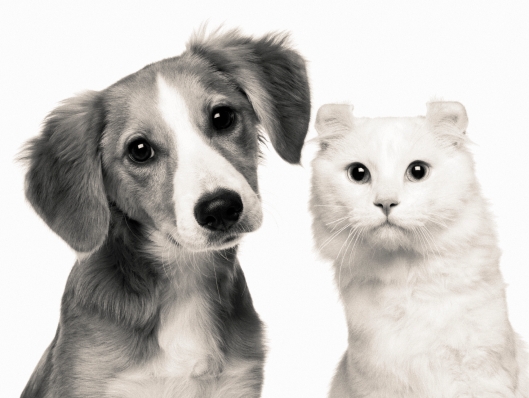Tags
animals, cats, cruelty, dogs, ethics, health, meat eating, perspective, pets, vegetarianism

As an unabashed left-winger and animal lover, I often think about how my meat eating habit squares with my politics and morals. How can I eat cows and pigs, but balk at eating dogs and cats? Why do I draw these lines and accept hypocritical assumptions without losing any sleep at night?
It’s a tricky subject with no easy answer. My vegan and vegetarian friends and acquaintances may refrain from eating meat themselves, but they do feed meat to their pet cats and dogs (though I know they would impose a vegetarian diet if they knew their pets could handle it). The main philosophy behind ethical vegetarianism is that one need not impose suffering and death on others so that you may live. I certainly agree with this in most cases, but upon closer examination I realize that it’s not always so simple. It’s one thing to refrain from buying sweatshop manufactured clothing, quite another to assume that plants are fine with dying so that we may live.
The problem with this philosophy is that it assumes that plants do not feel or suffer; that they don’t mind being your dinner the way an animal would; which is completely wrong. Plants have evolved many techniques to avoid being consumed, which include growing thorns and secreting potent poisons that can sicken or kill. Don’t mistake a plant’s inability to scream and run away as an invitation to eat it–plants came into this world long before we did and to this day, continue to struggle and live just as we do.
That said, I do love animals in general and oppose animal cruelty in all its forms. I try my best to be an ethical meat eater, though it is extremely difficult given how embedded the industrial food system is in our society. It has been suggested that the only way I can be truly ethical is to give up meat altogether, but unfortunately my health won’t allow it. Not everyone is built the same, and not everyone will benefit from a meat-free diet, for better or for worse. So if meat-eating cannot be realistically eliminated, what can or should be done?
A. Strictly regulate animal farms and slaughterhouses.
- Ban animal overcrowding. This encourages stress and infection among the captive animals, which leads to antibiotic overuse, which we ingest to the detriment of our health. While overcrowding ensures the superficial cheapness of our meat in the grocery store, the costs to our health remain unaccounted for. With the recent explosion of antibiotic resistant infections, perhaps it’s time we realize just how expensive chicken truly is, no matter what the sticker price says.
- No feeding recycled dead animals to naturally vegetarian animals. You are what you eat, and this is no different with animals.
- Slaughter methods must inflict a quick and humane death, and must be safe for the administering employees. Too often, slaughterhouse employees must endure horrible and unsafe working conditions so we can have cheap meat on the table. Not only is this unacceptable in the moral sense, but for the public’s collective health as well. When slaughterhouse employees are “encouraged” to process animals as quickly as possible, serious injuries and missing body parts are bound to happen.
- Revamp animal waste management practices to minimize and mitigate environmental impact and maximize animal health. Shortcuts that save these companies money often cost the public dearly, in the form of irreversible environmental damage and the negative downstream impact on public health.
- Animal well being should be a priority. While I’m not advocating the animal equivalent of Club Med, it should have the chance to live well before it meets its end on our dinner table.
B. Diversify animal protein sources
- Eat more insects, which require less land, water and feed to produce than traditional food animals like cows, pigs, and chicken. High protein and low fat, insects are a fantastic health food as long as you can get past your cultural bias.
- Develop and perfect lab grown meat.
- Eat less water and land intensive meat (cows, chickens, pigs) to preserve the environment.
This proposed outline is by no means perfect. It doesn’t address cultural hypocrisy in any way. I understand that cows, pigs and chickens are sentient beings with personalities. I don’t eat enough insects because I’m no good at catching and preparing them, and the curry flavored crickets I bought at the novelty store taste like crap. Our cat and dog need to eat, so I feed them cow, chicken, and fish.
I suppose its’ more accurate to say that I love certain kinds of animals. Still, selective love is no excuse for unnecessary cruelty and sadism (not that cruelty or sadism has ever been necessary). I’ve never loved a cow or a turkey, but that doesn’t mean it’s ever ok to torture and abuse it.
We live in a world where the dead nourish the living. Whether that’s fair or moral, I honestly don’t know.
